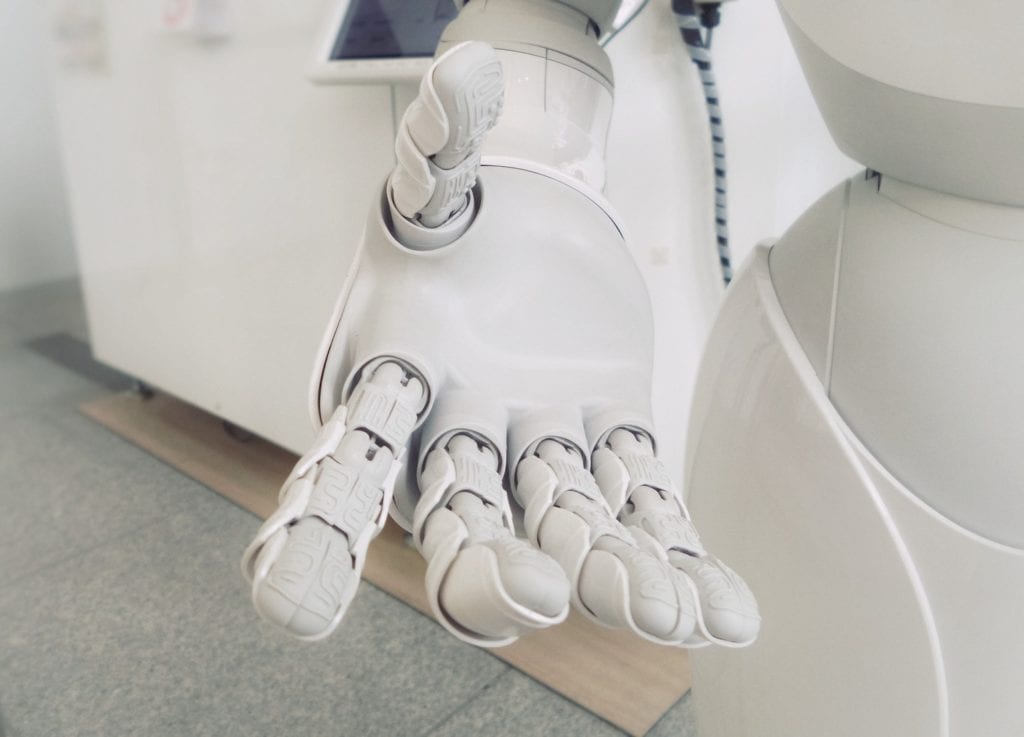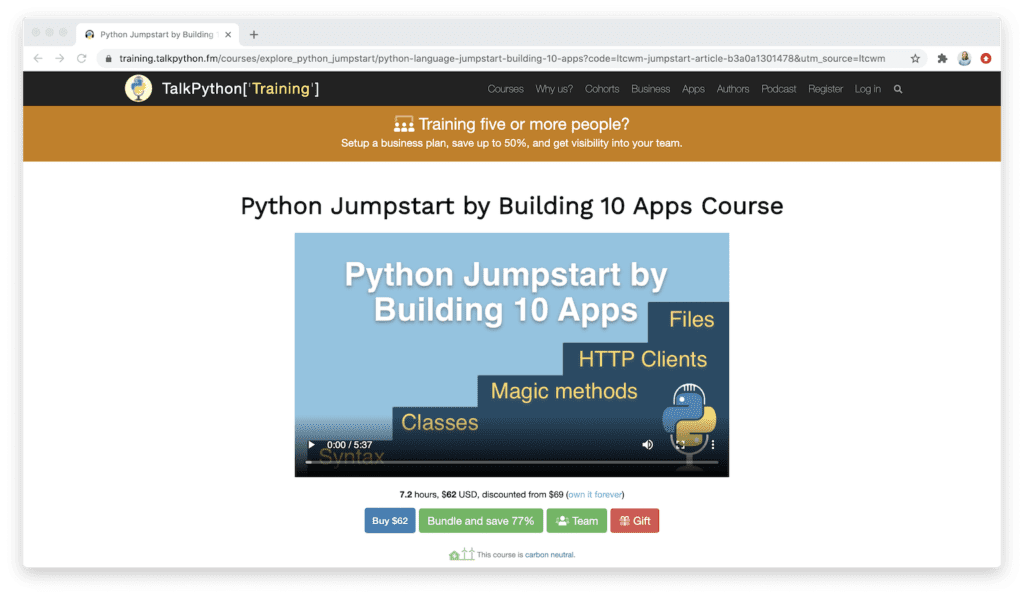Are you trying to decide what programming language to learn?
Maybe you’re looking for a language that’s useful and powerful, but still accessible to new coders. Maybe you’ve already started coding and you’re considering Python, but not sure if it’s the right language for you. Whatever your situation or current level of coding knowledge, this post will help you decide if you should learn Python or not.
This post is sponsored by Talk Python Training. If you’re excited about learning Python by the end of this article, Talk Python Training is the perfect place to go. There are so many great Python courses and bundles available, starting from total beginner courses that require no coding experience and gradually building up your skills to a more advanced level. (At the end, I’ll share some special discounts for you!)
Let’s first go over what Python is, what you can do with it, why to learn Python, what Python jobs you can get… and basically, why Python is an amazing language for anyone to learn!
Table of Contents
- What Is Python?
- Why Learn Python as Your First Coding Language?
- What Can You Do With Python?
- Using Python to Build Projects & Freelance
- Python Jobs & Salaries
- Why Learning Python Is Perfect for Career-Changers (+ Examples!)
- How Long Does it Take to Learn Python?
- Ready to Learn Python? Here’s What to do Next!
What Is Python?
First released in 1991, Python is an object-oriented programming language known for being easy to learn, yet extremely powerful and being one of the fastest growing languages in the world.
Since it’s a general purpose language, it can be used for almost anything, making it a great first language for aspiring programmers, data scientists, robotics engineers, web developers, DevOps engineers, and more! (More on these different types of Python jobs later.)
Absolute beginners and advanced professionals alike can find tons of uses for Python
There’s a wide variety of projects you can work on with Python. For example, Python has over a quarter million third-party packages available in the Python Package Index that lets you find and install Python libraries and frameworks developed and shared by the Python community.

Head back to the table of contents »
Why Learn Python as Your First Coding Language?
Now you know what exactly Python is. But why are so many people outside of programming (e.g., astronomy, law, journalism) choosing Python when they start learning how to code? There are quite a few compelling reasons why learning Python is great as a beginner!
👩💻 #1: Learning Python is easy and powerful right away — but you don’t outgrow it.
That means it’s relatively quick and easy to get started, but there are so many things you can do with it. With so many libraries, modules, frameworks, and use cases to explore, it’s versatile and flexible. In other words, Python is great for beginners, but also great for the most advanced developers and experts.
💻 #2: Everything you need to write Python is available for free online; it has a low barrier to entry. All you need is a text editor (e.g. VS Code, PyCharm Community Edition, and others) and Python installed on your computer.
📖 #3: Python code is easy to read. It somewhat resembles English and there’s indentation to make things easier to follow (and easier to spot bugs!). You don’t have to spend a lot of time trying to understand complicated syntax…you can jump right in and start building projects almost immediately.
🤖 #4: Tons of career options are available when you know Python. They span from web development to robotics to data science and more (we’ll cover lots of potential Python career paths later on in the article).
💬 #5: You can tap into a highly supportive community. Since Python is so popular, there’s a wealth of resources and community support available. You can ask questions on Stack Overflow (or look through over one million questions that have already been answered) and get involved in different forums (e.g., https://python-forum.io/), conferences (e.g., PyCon), and read through Python documentation.
There are also lots of tutorials and courses available online. One to check out is Python for Absolute Beginners, a course that teaches you software development with Python from the ground up. (Learn to Code With Me readers get 10% off)

Head back to the table of contents »
What Can You Do With Python?
We’ve already mentioned that Python is an incredibly versatile language…which may have sparked the question “What can I do with Python?” Let’s get into some of its most common applications.
Web development
Since there are so many Python web frameworks (e.g., Django, Flask, web2py), building websites with Python can be quick and easy. These Python frameworks can help you build reliable, scalable, and maintainable web apps. Check out 4 Python Web Frameworks, Compared.
Data extraction
Python has many web scraping tools, such as Selenium, and frameworks like Scrapy, that allow you to retrieve and organize data from various web pages. This can be used to make price comparisons, gather email addresses, find out what’s trending on Twitter, and much more!
Testing
Python has a built-in unit test framework called PyUnit, making it easy to make sure your code will work as expected. And of course, Python has the third-party pytest framework making testing even easier.
Automation
You can use Python to write programs that complete tedious tasks in minutes, rather than hours. For example, you can automate tasks like renaming files and folders, sending emails, filling out online forms, and much more.

Blockchain
Not just for the digital currency Bitcoin, blockchains can be used for almost any kind of transaction, financial or not. Find out more about using Python for blockchain development in this episode of the Talk Python To Me podcast.
Machine learning applications
You can use Python to train machine learning models and build things like recommendation systems and face or voice recognition software. Two of the most popular Python libraries and frameworks for machine learning are scikit-learn and TensorFlow.
Robotics
You can use Python to program robots. You can use rospy, for example, which is a Python library for Robot Operating System (ROS). Learn how to use ROS and ROSPy to program robots in this podcast episode.

As you can see, Python can be used for simple, entry-level use cases, as well as more advanced, expert-level projects like AI, machine learning, and robotics. That means there’s tons of room to grow. No need to learn a new language as you advance because you’ll never “outgrow” Python.
Head back to the table of contents »
Using Python to Build Projects & Freelance
Python is somewhat unique in that with just a partial understanding of the language and concepts, you can still be very productive with it. Even a basic knowledge can be very helpful and you can do a lot with it.
It has one of the smallest learning curves of all programming languages, so you can almost immediately start building projects, adding to your portfolio, and even taking on clients.
Want to get started building Python projects now? Check out Python Jumpstart by Building 10 Apps Course, where you’ll build projects like a birthday app, weather client, wizard battle, personal journal, and more! (P.S. Learn to Code With Me readers get a 10% discount by going through this link.)

Head back to the table of contents »
Python Jobs & Salaries
Not only is Python a great first language for people looking to break into tech, but it can also be highly lucrative. Here’s just a sample of what your earning potential could be, based on knowledge level and career path.
💰 Average Python developer salary by the level of knowledge in the US (all states):
- Junior Python developer: $77,834/year
- Mid-level Python developer: $111,899/year
- Senior Python developer: $130,268/year
And it’s not just “Python developer” that can be your new role title when you learn Python. There are tons of other tech jobs you can get when you know Python — and there’s something for everyone.
For example, here are some careers and salaries (with some examples & extra career info from the Talk Python To Me podcast):
- Data scientist: $119,413/year — Learn more about how to build a data scientist career in this podcast episode.
- Data analyst: $67,294/year
- Software developer: $86,523/year
- Quality assurance (QA) engineer: $84,888/year
- Machine learning engineer: $130,530/year — Hear about using Python for machine learning here.
- Web developer: $75,073/year
- DevOps engineer: $114,359/year — Learn more about this career path in this article.
- Financial analyst: $67,900/year — Listen to how Python is used in the financial industry.
- Robot developer: $72,890/year — Check out how to become a robot developer with Python.
- Cyber security analyst: $112,974/year
- Research scientist: $81,838/year
- Climate science researcher: $63,817/year — Listen to how one researcher is using Python to understand what the climate models are telling us.
- Geoscientist: $91,428/year — Python can be used to solve computational problems about the inner workings of the Earth.
💡 The list doesn’t end there! Check out this podcast episode on the paths into a data science career.
Head back to the table of contents »
Why Learning Python Is Perfect for Career-Changers (+ Examples!)
Something else that makes Python so amazing is the fact that it attracts people from all different backgrounds. If you’re looking for a career change, Python can open so many doors—and you’ll be in good company when you walk through them! Just check out these stories featured on the Talk Python To Me podcast…
Carolyn Stransky transitioned from journalist/editor to Python developer. She discovered a powerful connection between Python, machine learning, and bringing information to the public. Listen to her story here.
Giuseppe Cunsolo transitioned from medical school student and ambulance paramedic to DevOps engineer. Brian Skinn transitioned from chemical engineer to research scientist. Teresa Borcuch transitioned from biologist to data scientist. Listen to Giuseppe, Brian, and Teresa’s stories in this podcast episode.
Jim Taysom transitioned from geography to full-time development. Arash Soheili went from organic chemist to senior software engineer. Rob Ward went from accountant to data analyst (and is looking to move into data science). Listen to Jim, Arash, and Rob’s stories in this podcast episode.
Head back to the table of contents »
How Long Does it Take to Learn Python?
Like we’ve talked about before, learning Python can be quick — even for beginner programmers. But how quick?
According to Career Karma, it takes an average of eight weeks to learn the basics of Python (e.g., statements, loops, variables, functions, and data types). Of course, it depends on how many hours you’re spending studying per week, but this is assuming you’re studying a little bit each day.

Mastering the language can take a lot longer, since there are so many possibilities with Python and it depends on your career goals. For example, if you want to use Python to build machine learning models, it will probably take longer than if you want to use Python for web development.
Head back to the table of contents »
Ready to Learn Python? Here’s What to do Next!
Of course, you can find courses about Python on plenty of e-learning platforms like Udemy, Codecademy, and others. These can be good options, but for a deep beginner-to-advanced dive into Python from experts in the space, turn to a platform that specializes in only Python: Talk Python Training.
Talk Python Training started back in 2016, with a mission to provide high-quality Python training without the fluff. Founder Michael Kennedy has taught over 100 in-person classes to developers on four continents, and now anyone can benefit from his and other authors’ wealth of knowledge and experience via the online courses on Talk Python Training. Whether you’ve never coded before in your life or you’re looking to gain a more intermediate or advanced level, there’s a Python course there for you!
Here’s why Talk Python Training is a great platform:
- You learn by doing, instead of trying to memorize boring information. Courses are built around goals and tasks, not just the facts of programming
- The course library is all Python, created by authors who are experienced and passionate about the language
- Talk Python Training has **live**, online office hours to answer your questions
- You get the opportunity to go through a course with fellow students at the same pace, so you can motivate one another, stay accountable, and know there are people on the journey with you
💸 Plus, there’s a 2-week 100% money-back guarantee. So if you decide it’s not right for you, you lose nothing.
Talk Python Training has tons of top-notch Python courses to get you started. But here are two hands-on, beginner-friendly favorites (LTCWM readers get 10% off just by clicking)!
- Python for Absolute Beginners: In this course, you’ll start from the very beginning, no previous coding experience required. Go from the big ideas and concepts covered in a typical CS 101 course to writing increasingly complex code and applications in Python. Games you’ll build include guessing the number of M&Ms in a jar, Rock-Paper-Scissors (3-way and 7-way), and more!
- Python Jumpstart By Building 10 Apps: This training is for people who have a bit more knowledge of programming (e.g., you know what a variable, a function, and a loop are). It teaches you how to build 10 different apps, from a personal journal to a file searcher app to a movie lookup app.
You can check out Talk Python Training’s other courses by browsing their library here.

Whether you’re a completely new coder or a seasoned developer looking to add a new language to your arsenal of skills, it’s hard to think of a better choice for today’s world than Python. This language can open so many doors for you, even if you’re not sure what direction you want to take in tech! No matter what your background or your goals, Python skills can help you build a better future.
Excited to see how learning Python can accelerate your journey to success in tech!

